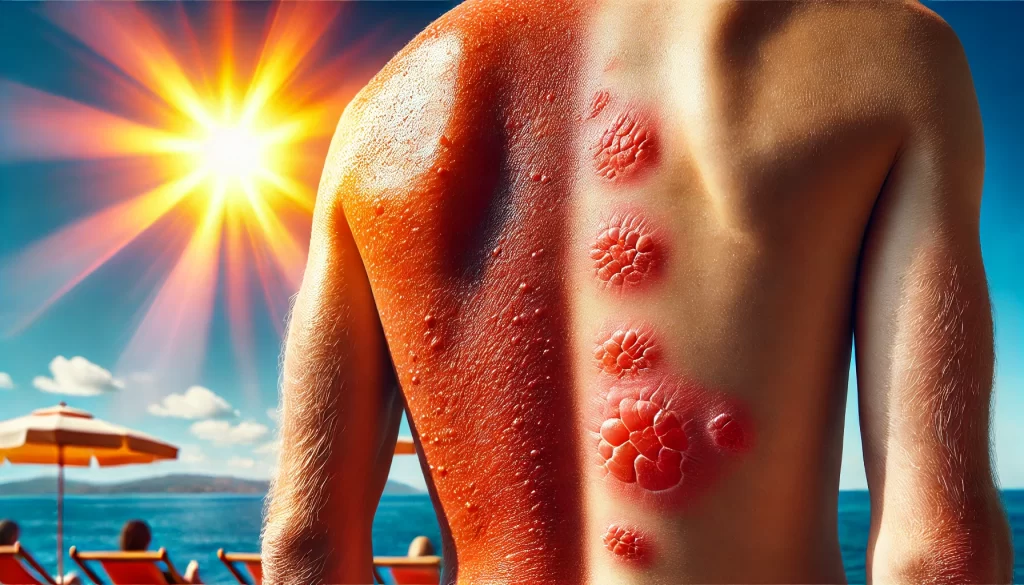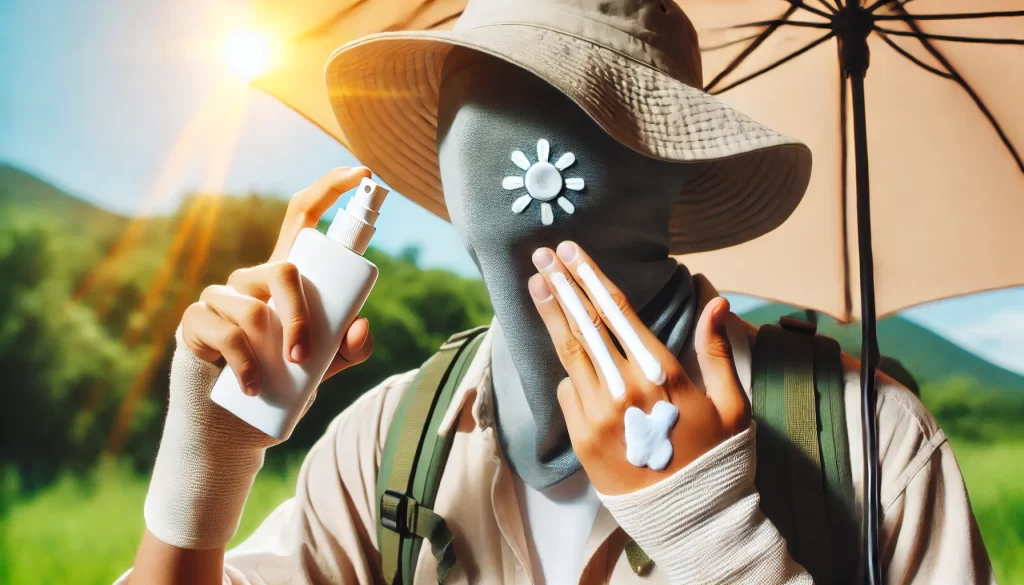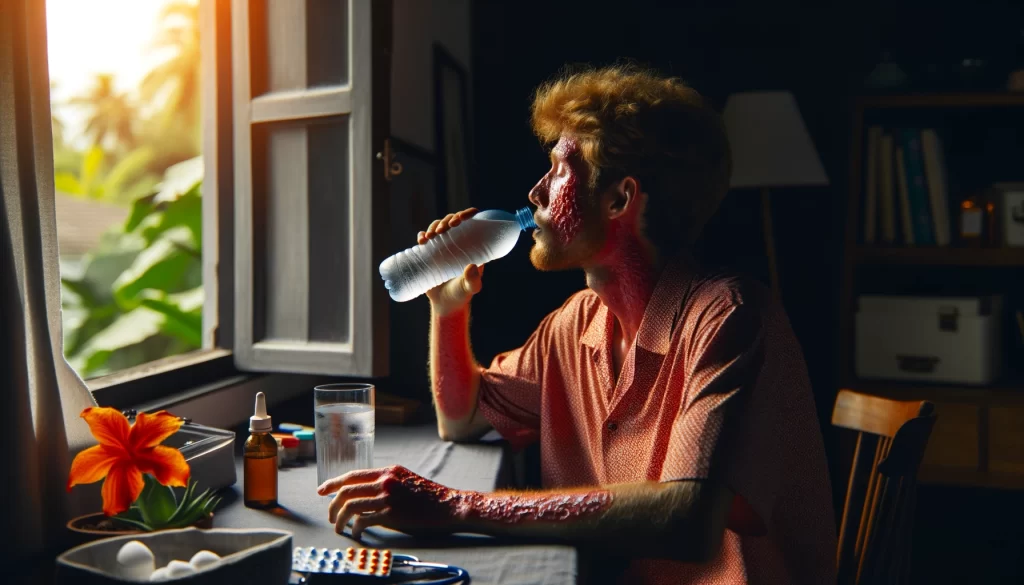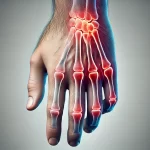Table of Contents
Can You Die From Sun Poisoning? It can lead to dangerous consequences, and it raises a common question: Can you die from sun poisoning? In this article, we’ll explore the risks, symptoms, and preventive measures related to sun poisoning and what to do if you or someone you know is affected. The goal is to inform you about this condition and the severe harm it can cause if not treated properly.
Can You Die From Sun Poisoning? What Is Sun Poisoning?

Can You Die From Sun Poisoning? Sun poisoning, also known as severe sunburn, occurs when your skin is exposed to intense UV rays for too long. It goes beyond the typical sunburn and often results in symptoms that resemble an allergic reaction. Sun poisoning can develop quickly, primarily when you don’t protect yourself from prolonged exposure to the sun.
Unlike mild sunburns, which cause redness and discomfort, sun poisoning can lead to serious health issues, including blistering, swelling, and systemic symptoms like fever and dehydration.
Can You Die From Sun Poisoning?
So, can you die from sun poisoning? While death from sun poisoning itself is rare, the complications it triggers can be life-threatening. Severe dehydration, heatstroke, or secondary infections from blistered skin can cause dangerous health problems. If left untreated, these complications can result in organ failure or other critical conditions that may lead to death.
Recognizing the signs early and seeking medical attention is essential to avoid life-threatening outcomes.
Symptoms of Sun Poisoning
Recognizing the symptoms of sun poisoning is vital to preventing serious consequences. The symptoms often appear a few hours after sun exposure and may include:
Severe redness and blistering
Your skin may become highly red and blistered, more severe than a sunburn.
Pain and swelling
The affected areas may become painful, tender, and swollen.
Fever and chills
Sun poisoning can cause your body temperature to rise, leading to fever and chills.
Headache and dizziness
You may experience headaches or dizziness, indicating heat-related issues.
Nausea and vomiting
Feeling sick to your stomach is another sign that your body reacts to excessive sun exposure.
Dehydration
Lack of fluids in your body can occur due to overheating, leading to dehydration.
If you or someone else experiences these symptoms after a day in the sun, treating them immediately is essential to avoid worsening the condition.
Why Is Sun Poisoning So Dangerous?

Sun poisoning is dangerous because it affects more than just the skin. The body’s reaction to extreme UV exposure can cause complications beyond a typical burn.
- Heatstroke: One of the most severe risks of sun poisoning is heatstroke, a condition in which the body overheats and cannot cool down. This can lead to confusion, seizures, or even loss of consciousness.
- Dehydration: Sun poisoning can cause dehydration, as your body loses fluids to cool down. Dehydration can affect your organs, leading to severe consequences if left untreated.
- Infection: The blisters caused by sun poisoning can open, making your skin vulnerable to disease. A skin infection may spread, potentially leading to more significant health problems.
Who Is at Risk for Sun Poisoning?
Some people are more susceptible to sun poisoning than others. Knowing if you’re at higher risk can help you take extra precautions when out in the sun.
Fair-skinned individuals
Those with lighter skin tones are more likely to suffer from sun poisoning because they have less melanin, which offers some natural protection against UV rays.
People with a history of sunburns
If you’ve had frequent sunburns, your skin may be more sensitive, increasing the risk of sun poisoning.
Outdoor workers and athletes
People who spend much time outdoors, especially without proper protection, are more prone to sun poisoning due to prolonged exposure.
Certain medications
Some medications make your skin more sensitive to the sun, increasing the risk of sun poisoning. These include antibiotics, acne treatments, and anti-inflammatory drugs.
How to Treat Sun Poisoning
If you suspect sun poisoning, immediate action is essential. Here’s what to do to prevent the situation from worsening:
Get out of the sun
Find shade or go indoors immediately to stop further exposure.
Cool the skin
Apply cool compresses or a cool bath to lower your body temperature and soothe the skin.
Stay hydrated
Drink plenty of water to rehydrate and help your body recover from the dehydration caused by sun exposure.
Take over-the-counter pain relievers.
If needed, take pain relief medications like ibuprofen to ease discomfort.
Apply aloe vera or hydrocortisone cream.
These lotions can aid in promoting healing and lowering inflammation.
Seek medical attention
If your symptoms are severe or worsening, see a doctor immediately. You may need stronger medications or IV fluids to recover fully.
How to Prevent Sun Poisoning

Prevention is always better than cure, and taking the proper precautions for sun poisoning is essential. Can you die from sun poisoning? While it’s rare, taking the necessary steps to protect yourself can prevent dangerous complications. Being cautious reduces the risks, so you never have to ask, can you die from sun poisoning?
Use sunscreen
Use it every two hours, particularly while you’re sweating or swimming.
Wear protective clothing
Cover your skin with lightweight, long-sleeved shirts and wide-brimmed hats to protect yourself from direct sunlight.
Avoid peak sun hours.
The highest UV radiation from the sun occurs between 10 a.m. and 4 p.m., so try to spend these times indoors or under cover.
Stay hydrated
Drink water regularly throughout the day, especially when in the sun.
Also Read: Can You Get Gout in Your Hands? Shocking Truth You Must Know
When to See a Doctor
In some cases, sun poisoning requires medical intervention.
- Experience severe blisters or swelling that doesn’t improve.
- Have a high fever, nausea, or vomiting.
- Feel dizzy, confused, or faint.
- Show signs of infection, like pus or extreme redness around the blisters.
These symptoms may indicate a more severe reaction to sun poisoning, and timely medical help can prevent further complications. Can you die from sun poisoning? While it’s rare, death from sun poisoning is possible due to the severe complications it can cause, such as dehydration, infection, and heatstroke. Understanding the risks, symptoms, and treatment options is crucial for answering the question, can you die from sun poisoning?
Protecting yourself from the sun and knowing when to seek help can reduce the risk of sun poisoning and its potential dangers. The key to avoiding asking, can you die from sun poisoning, is to prevent exposure and take quick action if symptoms appear. Can you die from sun poisoning? Though unlikely, the risks are real, and knowing how to stay safe is essential.



